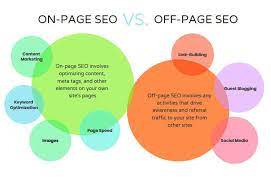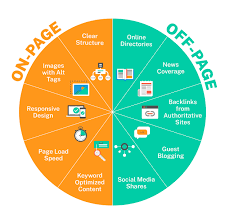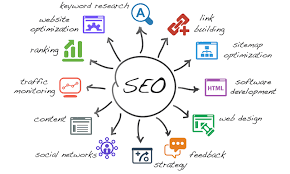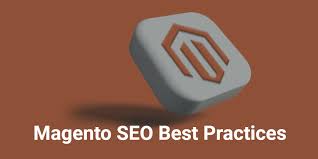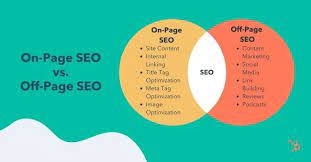Mastering the Art of On-Page and Off-Page SEO Strategies in Digital Marketing
The Importance of On-Page and Off-Page SEO in Digital Marketing
Search Engine Optimization (SEO) is a crucial element of any successful digital marketing strategy. It involves various techniques to improve a website’s visibility on search engine result pages. Two key components of SEO are On-Page SEO and Off-Page SEO, each playing a vital role in enhancing a website’s search engine rankings.
On-Page SEO
On-Page SEO refers to the optimization strategies implemented directly on the website itself. This includes elements such as meta tags, headings, keyword placement, content quality, internal linking structure, and site speed. By focusing on On-Page SEO, webmasters can ensure that their website is user-friendly, relevant to search queries, and easily crawlable by search engine bots.
One of the primary goals of On-Page SEO is to provide valuable content that satisfies users’ search intent. This involves creating high-quality, informative content that incorporates relevant keywords naturally. Additionally, optimizing meta tags such as title tags and meta descriptions can improve click-through rates from search engine results pages.
Off-Page SEO
Off-Page SEO, on the other hand, refers to external factors that influence a website’s search engine rankings. This includes backlinks from other reputable websites, social media signals, online reviews, and brand mentions across the web. Off-Page SEO helps search engines evaluate the credibility and authority of a website based on its reputation and popularity among other online entities.
Backlinks are a crucial aspect of Off-Page SEO as they act as “votes of confidence” from other websites. High-quality backlinks from authoritative sources can significantly boost a website’s ranking in search results. Social media signals also play a role in Off-Page SEO by increasing brand visibility and driving traffic to the website.
The Synergy Between On-Page and Off-Page SEO
Both On-Page and Off-Page SEO are essential for achieving optimal search engine rankings and driving organic traffic to a website. While On-Page SEO focuses on optimizing individual web pages for targeted keywords and user experience, Off-Page SEO builds credibility and authority through external signals like backlinks.
By integrating both On-Page and Off-Page SEO strategies into their digital marketing efforts, businesses can establish a strong online presence that resonates with both users and search engines. Continuous monitoring, analysis, and refinement of these strategies are key to staying competitive in the ever-evolving landscape of digital marketing.
In conclusion, mastering the art of On-Page and Off-Page SEO is crucial for businesses looking to enhance their online visibility, attract organic traffic, and ultimately drive conversions. By understanding the importance of these two components and implementing best practices accordingly, webmasters can position their websites for success in the highly competitive world of digital marketing.
Essential On-Page and Off-Page SEO Tips for Enhancing Your Website’s Performance
- Create high-quality, relevant content for your website.
- Improve website loading speed for better user experience.
- Optimize images with descriptive filenames and alt text.
- Use internal linking to connect related content on your website.
- Ensure mobile responsiveness for a seamless user experience on all devices.
- Optimize URL structure to be clear and SEO-friendly.
- Regularly update and refresh your content to keep it relevant and engaging.
- Build quality backlinks from reputable websites in your industry/niche.
- Utilize local SEO strategies such as creating Google My Business listing.
Create high-quality, relevant content for your website.
Creating high-quality, relevant content for your website is a fundamental tip for both On-Page and Off-Page SEO success. By developing informative and engaging content that resonates with your target audience, you not only improve user experience on your site but also increase the likelihood of attracting valuable backlinks from other reputable websites. Quality content that incorporates relevant keywords naturally can enhance your website’s visibility in search engine results pages, ultimately driving organic traffic and boosting your overall search engine rankings. Remember, content is king in the world of SEO, so investing time and effort into crafting compelling material can yield significant long-term benefits for your online presence.
Improve website loading speed for better user experience.
Enhancing website loading speed is a fundamental tip in both On-Page and Off-Page SEO strategies to improve user experience. A fast-loading website not only keeps visitors engaged but also positively impacts search engine rankings. By optimising elements such as image sizes, reducing unnecessary scripts, and leveraging browser caching, webmasters can create a seamless browsing experience that encourages users to stay on the site longer. Prioritising website loading speed demonstrates a commitment to user satisfaction and can lead to higher conversion rates and improved overall performance in search engine results pages.
Optimize images with descriptive filenames and alt text.
When it comes to On-Page and Off-Page SEO, a crucial tip is to optimise images by using descriptive filenames and alt text. By incorporating relevant keywords into image filenames and alt text, webmasters can improve the visibility of their website in search engine results. Descriptive filenames not only help search engines understand the content of the image but also contribute to overall keyword optimisation on the page. Alt text serves as a textual description of an image for visually impaired users and search engine crawlers, making it an important accessibility feature that also enhances SEO efforts. Implementing this best practice ensures that images on a website are not only visually appealing but also contribute positively to its search engine rankings.
Use internal linking to connect related content on your website.
Utilising internal linking is a valuable strategy to enhance both On-Page and Off-Page SEO efforts. By strategically linking related content within your website, you not only improve user navigation and engagement but also signal to search engines the relevance and hierarchy of your web pages. Internal linking helps search engine crawlers discover and index content more efficiently, ultimately boosting the overall visibility and authority of your website. This practice not only strengthens the interconnectedness of your content but also contributes to a cohesive user experience, driving organic traffic and improving search engine rankings.
Ensure mobile responsiveness for a seamless user experience on all devices.
Ensuring mobile responsiveness is a critical tip for effective On-Page and Off-Page SEO strategies. With the increasing use of mobile devices for browsing the internet, websites must be optimised to provide a seamless user experience across all screen sizes. A mobile-responsive design not only enhances user engagement and satisfaction but also positively impacts search engine rankings. By prioritising mobile responsiveness, businesses can cater to a wider audience, improve their website’s visibility, and ultimately drive more organic traffic and conversions.
Optimize URL structure to be clear and SEO-friendly.
Optimising the URL structure of a website is a fundamental aspect of both On-Page and Off-Page SEO strategies. By ensuring that URLs are clear, concise, and contain relevant keywords, webmasters can enhance the site’s search engine visibility and user experience. A well-optimised URL structure not only helps search engines understand the content of a page but also makes it easier for users to navigate the website. By incorporating targeted keywords into URLs and organising them in a logical hierarchy, websites can improve their chances of ranking higher in search results and attracting organic traffic.
Regularly update and refresh your content to keep it relevant and engaging.
Ensuring the regular updating and refreshing of your website content is a fundamental tip for effective On-Page and Off-Page SEO strategies. By keeping your content current, informative, and engaging, you not only cater to the evolving needs of your audience but also signal to search engines that your website is active and relevant. Fresh content helps improve user experience, encourages return visits, and can attract valuable backlinks from other websites. Consistently updating your content demonstrates your commitment to providing valuable information, which can positively impact your search engine rankings and overall online visibility.
Build quality backlinks from reputable websites in your industry/niche.
Building quality backlinks from reputable websites within your industry or niche is a fundamental tip for enhancing both On-Page and Off-Page SEO strategies. Securing backlinks from authoritative sources not only improves your website’s credibility and trustworthiness in the eyes of search engines but also drives relevant traffic to your site. By establishing connections with reputable websites that share similar interests or expertise, you not only boost your search engine rankings but also strengthen your online presence within your specific industry or niche. This proactive approach to building quality backlinks can significantly impact your website’s visibility and authority, ultimately contributing to long-term success in the competitive digital landscape.
Utilize local SEO strategies such as creating Google My Business listing.
To enhance your online visibility and attract local customers, it is essential to leverage local SEO strategies, such as creating a Google My Business listing. By setting up a Google My Business profile, businesses can ensure that their information is accurate and easily accessible to potential customers searching for products or services in their area. This not only improves local search rankings but also enhances credibility and trust among local audiences, ultimately driving more foot traffic and conversions to the business.
